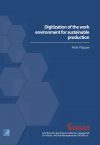Search


Bibtex
Cite as text
@Inbook{Schneider+Riedel+Bauer,
Cite-key = "Schneider2022",
Year= "2022",
Volume= "Schriftenreihe der Wissenschaftlichen Gesellschaft für Arbeits- und Betriebsorganisation (WGAB) e. V.",
Pages= "Seiten 37-59",
Journal = "Uncategorized",
Title= "Review: Model-based Systems Engineering and Artificial Intelligence for Engineering of Sustainable Systems – What contribution can systems engineering and artificial intelligence provide for the engineering of sustainable systems as of today?",
Author= "Benjamin Schneider, Oliver Riedel, Wilhelm Bauer,
Fraunhofer-Institut für Arbeitswirtschaft und Organisation IAO",
Doi= "https://doi.org/10.30844/WGAB_2022_3",
Abstract= "Advanced Systems Engineering (ASE) is a paradigm for the efficient design and creation of tomorrow's products and services. Challenges, which the new paradigm addresses, are the increasing complexity of products and systems, increasing requirements from the regulatory side as well as the sustainability and manageability of the systems. Advanced Systems Engineering offers a variety of approaches for handling the requirements mentioned before. This paper focuses on supporting the handling of the increasing complexity and the requirements for sustainability of systems by the combined use of Model-based Systems Engineering (MBSE) and Artificial Intelligence (AI) in the early phase of product development. First, the paradigms and approaches ASE, MBSE, sustainability, and AI are presented. Subsequently, the current state of the art in the intersection of the described topics is explained in the context of a literature review. The methodology applied here follows the Systematic Literature Review approach. Based on this, potentials and white spots in research are identified and described. The paper concludes with recommendations for connecting to future research in the areas described.",
Keywords= "Advanced Systems Engineering, Sustainability, Circular Economy, Model-Based Systems Engineering, Artificial Intelligence
",
}
Benjamin Schneider, Oliver Riedel, Wilhelm Bauer,
Fraunhofer-Institut für Arbeitswirtschaft und Organisation IAO(2022): Review: Model-based Systems Engineering and Artificial Intelligence for Engineering of Sustainable Systems – What contribution can systems engineering and artificial intelligence provide for the engineering of sustainable systems as of today?. Schriftenreihe der Wissenschaftlichen Gesellschaft für Arbeits- und Betriebsorganisation (WGAB) e. V.(2022), S. Seiten 37-59. Online: https://doi.org/10.30844/WGAB_2022_3 (Abgerufen 26.07.24)
Open Access
Abstract
Abstract
Advanced Systems Engineering (ASE) is a paradigm for the efficient design and creation of tomorrow's products and services. Challenges, which the new paradigm addresses, are the increasing complexity of products and systems, increasing requirements from the regulatory side as well as the sustainability and manageability of the systems. Advanced Systems Engineering offers a variety of approaches for handling the requirements mentioned before. This paper focuses on supporting the handling of the increasing complexity and the requirements for sustainability of systems by the combined use of Model-based Systems Engineering (MBSE) and Artificial Intelligence (AI) in the early phase of product development. First, the paradigms and approaches ASE, MBSE, sustainability, and AI are presented. Subsequently, the current state of the art in the intersection of the described topics is explained in the context of a literature review. The methodology applied here follows the Systematic Literature Review approach. Based on this, potentials and white spots in research are identified and described. The paper concludes with recommendations for connecting to future research in the areas described.
Keywords
Schlüsselwörter
Advanced Systems Engineering, Sustainability, Circular Economy, Model-Based Systems Engineering, Artificial Intelligence
References
Referenzen
..

 Deutsch
Deutsch